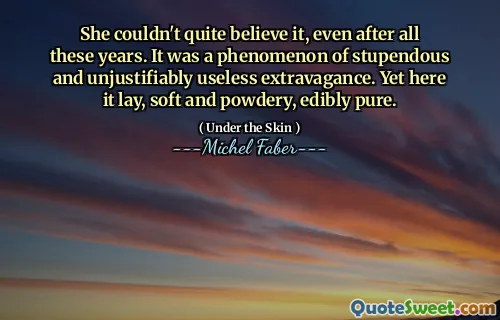
She couldn't quite believe it, even after all these years. It was a phenomenon of stupendous and unjustifiably useless extravagance. Yet here it lay, soft and powdery, edibly pure.
This passage evokes a sense of wonder and perplexity about a seemingly trivial yet extraordinary object or phenomenon that has persisted over time. The phrase 'stupendous and unjustifiably useless extravagance' suggests something that is undeniably impressive in its form or origin but also arguably unnecessary or frivolous in nature. The speaker's disbelief, despite the passage of years, highlights a sense of ongoing amazement—perhaps a mixture of nostalgia, curiosity, or bewilderment. The object described as 'soft and powdery, edibly pure' invites sensory imagery, conjuring thoughts of a delicacy or a rare commodity that is both appealing and somewhat enigmatic.
In a deeper sense, this quote can be seen as a meditation on the human tendency to prize the beautiful or unusual, sometimes without rational justification. It nudges us to question what we consider worth revering or holding onto, especially when it seems disconnected from practicality. The notion of innocence—'edibly pure'—perhaps hints at a fragile, pristine aspect of life or art that persists despite the weight of time and the world’s hustle.
Within the context of Michel Faber's 'Under the Skin,' such imagery may symbolize the allure of superficial beauty or the fascination with objects that mystify or captivate us. It reminds us that sometimes, we’re drawn to things not for their utility but for their ability to evoke emotional or aesthetic responses, irrespective of their seeming uselessness. Ultimately, this quote captures the mystique of treasured anomalies—things that persist in our consciousness because they evoke wonder and resonate with our innate desire for beauty and meaning, regardless of their practicality.






